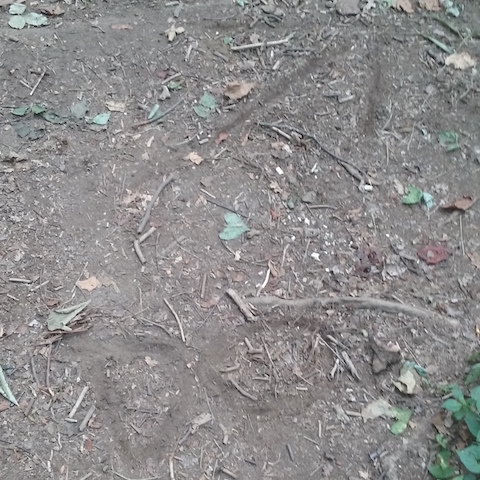AT Lesson #7: Be Aware of Informal Communications


If not for this message scrawled on the trail by a friend, I would have missed a beautiful overlook.
Do.
That’s all the message said. A single two-letter word, a command really, scrawled in the loose dirt on the trail. An arrow primitively drawn beside the word directed my attention toward a sparsely wooded and vine carpeted underbrush bisected by a narrow path. Tendrils encroached onto the trail, obscuring much of the footpath and dissuading potential travelers.
I looked around for the author of this monosyllabic directive. Nobody. I was alone.
I had started the day just four miles from here. I had camped with a newfound friend from Georgia at a small and secluded campsite that overlooked a beautiful valley. We had begun the day’s trek together, but my long-legged hiking mate was a long distance runner as well as an avid backpacker. His brisk pace and extended stride allowed him to cover much more ground with each step than me. Within twenty minutes, my hiking buddy was out of sight. That’s the custom on the AT; everyone hikes their own hike. I knew from the prior day, that he would stop within an hour or two for a break, allow me to catch up with him, and then we’d repeat the process.
Now two hours into the day’s journey, I hadn’t caught up with him. But there was this message in the dirt.
I pondered my options. I wanted to catch up with my friend. He was a nice guy and I enjoyed talking with him. While hiking together, the miles passed beneath our feet almost unnoticed. A trip down this side trail may put even more distance between us.
Yet, what lay at the end of this narrow trail was so compelling to someone that he didn’t want those who came after to miss it. So he left this message in the dirt.
Was this message meant for me? Or was it intended to guide someone else down the neglected path?
I checked my guidebook. There was no mention of this blue blazed trail. Nevertheless I decided that the cost of traveling down the path was probably pretty small, perhaps 30-minutes of elapsed hiking time and only a mile or so out of my way. That, I thought, is a minor price compared to the possibility of missing something grand. So, I shifted my pack and started optimistically down the small side trail.
AT Lesson #7: Be Aware of Informal Communications
The winding trail beneath the thin canopy of trees soon opened into wide knoll with a vast panoramic view of the rolling hills, the deep valleys, and the vivid foliage below. The cobalt blue sky was dotted with fluffy white clouds that created a spotted masterpiece of shadows on the green canvas below. It was majestic. It made me feel tiny and insignificant, yet simultaneously alive and full of vigor.
And I almost missed it. My official guidebook made no mention of this trail. If not for the impromptu and informal message of someone who had passed this way before me, I would have traveled within yards of this site never the wiser.
Informal communications, such as this, happen in every area of our lives. At work, we have official communications in the form of meetings and emails. At church and in volunteer organizations, we have the same thing. Yet there is always a back channel that provides near instant information when the official communication is lacking. As leaders, we must be aware that these channels exist.
Sometimes, these channels can be beneficial and enhance productivity, creativity, and growth. When our team turns to informal communications to do their jobs effectively, we must look for ways to embrace and support them. For example, if they are sharing how-to information, look for ways to formalize that through a wiki or a series of lunch & learns.
Other times these channels can be harmful, destructive, and lower morale. To combat the pernicious scuttlebutt or politically charged gossip, we must offer sufficient communication and clarity. We must invest in our teams and build individual relationships beforehand so that they will trust us despite what the rumor mill is circulating.
People are curious and relational by nature, and as such, they will find ways to communicate what is important to them. Be aware of that.
And by the way, when I caught up with my friend from Georgia later that day, he asked if I had seen and followed his message. I thanked him and told him that I’m glad I had.


Recent Comments